![]() We recommend reading The
Eternal Vow and Disciplines
in the Way of Adidam first.
We recommend reading The
Eternal Vow and Disciplines
in the Way of Adidam first.![]() Question: Thank you so much for the clarity and clarification! For years in the community
and after leaving, now years later, I see I "willed" my way to "practice" with
a recognition of and attraction to the Dharma, but not to the Spiritual Master,
Adi Da. I usually felt awkward and unfeeling in the devotional aspects of our
life together, suffering an emotional distance. Eventually I recognized it wasn't
enough, and left. I have wondered why this is so and suffered much stress over
the disparity. I value my time in the community and in the Company of Adi Da as
the greatest gift in my life for my human and spiritual growth and continue to
listen, read, etc. But I have NOT received the Revelation [recognition
of Adi Da as the Divine Person] you describe! Can any of the disciplines be
taken up outside of this Occurence to further the possibility of its Happening?
I remember in The
Bodily Location of Happiness, Adi Da said it was not possible without hearing to take up disciplines without a burdensome
and counterproductive obligation but I took them up anyway. We all did. What were
we all doing? Again, many thanks for your commentary!
Question: Thank you so much for the clarity and clarification! For years in the community
and after leaving, now years later, I see I "willed" my way to "practice" with
a recognition of and attraction to the Dharma, but not to the Spiritual Master,
Adi Da. I usually felt awkward and unfeeling in the devotional aspects of our
life together, suffering an emotional distance. Eventually I recognized it wasn't
enough, and left. I have wondered why this is so and suffered much stress over
the disparity. I value my time in the community and in the Company of Adi Da as
the greatest gift in my life for my human and spiritual growth and continue to
listen, read, etc. But I have NOT received the Revelation [recognition
of Adi Da as the Divine Person] you describe! Can any of the disciplines be
taken up outside of this Occurence to further the possibility of its Happening?
I remember in The
Bodily Location of Happiness, Adi Da said it was not possible without hearing to take up disciplines without a burdensome
and counterproductive obligation but I took them up anyway. We all did. What were
we all doing? Again, many thanks for your commentary!![]()
1. Life Changes Can Help Open One to the Divine Gift of Recognition of Adi Da as
the Divine Person — Even though taking up disciplines can't cause recognition
of Adi Da as the Divine Person, changes in one's life that free up attention and
energy from the places they usually are bound certainly can help open one
to that Gift, and increase one's chances of receiving it (and increase the chances
that that reception will be sooner rather than later). |  |
2. Self-Discipline is Necessary Prior to Hearing (and even All the Milestones
of the Way of Adidam) — For a period during Adi Da's early work with
devotees (as the person asking the question pointed out), He made the milestone of hearing a prerequisite before devotees could take up
disciplines, on the presumption that hearing would be generated simply as a free
Gift by being in His Company. But He later went on to reverse that order. Based
on observing what actually happened with His devotees, He concluded it was highly
unlikely that hearing would ever occur without an intensive "listening process"
(that included a full range of disciplines covering "the whole guy") complementing
the reception of His Transmission. | 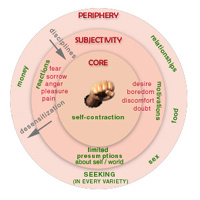 |
3. The Ego Will Always Find Another Door To Escape Through Unless All Doors Are Closed
— So, prior to hearing, disciplines have to be taken up — but in
an artful manner, based on what self-understanding one does already have;
what response to the Divine one is already experiencing; and what capacity for
enduring heat (tapas) one has already developed. If one takes
on disciplines to a degree that is matched by one's growth in these three capabilities,
then everything will be okay. Otherwise, one's will, idealism, or self-imagery
may be egoically propelling one "ahead of the game", and there will
be a backlash: either the ego will escape out another door; or the ego will be
suppressed (in the manner of an ascetic) rather than transcended, stifling rather
than freeing up energy and attention, and leading to what Adi Da referred to as
"mediocre practice". |  |
4. Understanding and Conforming to the Logic of Adaptation — In order to get a discipline to "stick" (as opposed to phasing in one's practice of it), one needs to understand the logic of adaptation for the given discipline. The first aspect of this is to recognize when a period of adaptation is necessary. For many disciplines, it simply is not a good idea to take them up "cold turkey" (overnight). But even if you understand that a process of adaptation is necessary for taking up certain new disciplines, you may not be aware of the form such an adaptation process should take, for best chances of success. |  |
5. Disciplining (and Understanding) Not Only the Self-Indulger but the Self-Discipliner; Allowing Oneself to Be "Lived" by One's True Self — We tend to associate the word, "discipline", with the curtailing of various forms of self-indulgence. But the ego is always appearing not only as self-indulgent tendencies but also as self-disciplining tendencies. Pairs of tendencies (self-indulgent and self-suppressive) always appear together, both sides of which are the ego, and which, together tend to create a chronic sense of dilemma, regardless of which side happens to be animated at the moment.
| 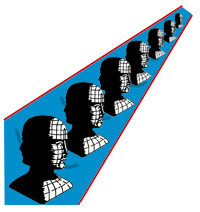 |
6. Transcending Identification, Differentiation, and Desire — Adi Da has described the ego as manifesting as three separate activities: identification, differentiation, and desire. These three activities correlate with the three components of the human body-mind: the "gross" or physical body, which manifests in every moment as desire or movement; the subtle body or "mind", which manifests in every moment as the activity of differentiation; and the causal body, which manifests in every moment as the activity of identification. Divine Realization requires self-transcendence, and self-transcendence requires transcendence of these three egoic activities or "presumptions" in every moment. The "two halves of the ego script" (mentioned in part 5) correspond to (self-contracted) desire and (self-contracted) differentiation. When these two are disciplined directly (and identification is impacted by practice of Ruchira Avatara Bhakta Yoga), then a progressive relaxation of identification occurs, over the course of one's practice of the Way of Adidam.
|
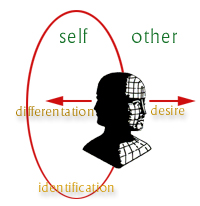 |
7. The Artfulness of Helping Others Take Up (and Persist in) Disciplines — When one becomes a devotee, one is, in effect, also "hiring" Adi Da to provide the Revelation, Blessing-Force, and wisdom for how and what to practice, in order to Realize the Divine; and "hiring" the culture of devotees to help one practice. At its best, the culture of devotees can be an enormous help in one's practice, and what Adi Da would call "good company". At its worst (through ignorance or immaturity), one's fellow devotees can be "bad company", and actually impede one's growth in practice. While we could write an entire book about the art involved in being a cultural server of one kind or another, we will just mention a few points here, in passing, to give you a sense for the issues involved. |
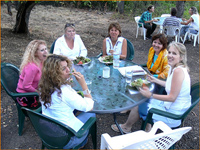 |
| 8. Making Life Changes Before Becoming a Devotee — Making any changes in life that free up
energy and attention before one becomes Adi Da's devotee (to serve the
Revelation of recognition of Adi Da as the Divine Person, that enables one to
practice the Way of Adidam) can be guided by the same principles that guide devotees
taking up disciplines, and which we discussed in parts 1 through 7. Really get
the principle of "the ego escaping out another door" and the need to
discipline and understand both the self-indulger and the self-controller. Thoroughly
study (and allow yourself to be moved by) Adi Da's Instruction on the discipline.
When possible, consult a devotee who has already adapted to the discipline for
advice, particularly on the logic of adaptation for this particular discipline.
Definitely consult devotees for advice on choosing disciplines, keeping in mind
the pitfalls that such devotees themselves can fall into, in their advice-giving.
Measure your own self-understanding against the taking on of such a life change. Measure your capacity for enduring heat. Measure your response to Adi Da. Even before you receive the Gift of recognizing Adi Da as the Divine Person, He can certainly already serve you as Spiritual Teacher. These are the "arms" that allow you to take up a discipline without complication. And to be sure, for each of us, some changes of behavior — particularly the beginning disciplines — simply are not that difficult. | 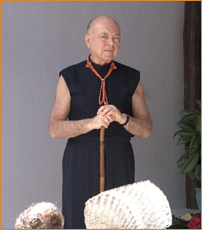 |
RETURN TO "QUESTIONS ABOUT TAKING UP THE WAY OF ADIDAM"
Be the first to post a comment on this article. |